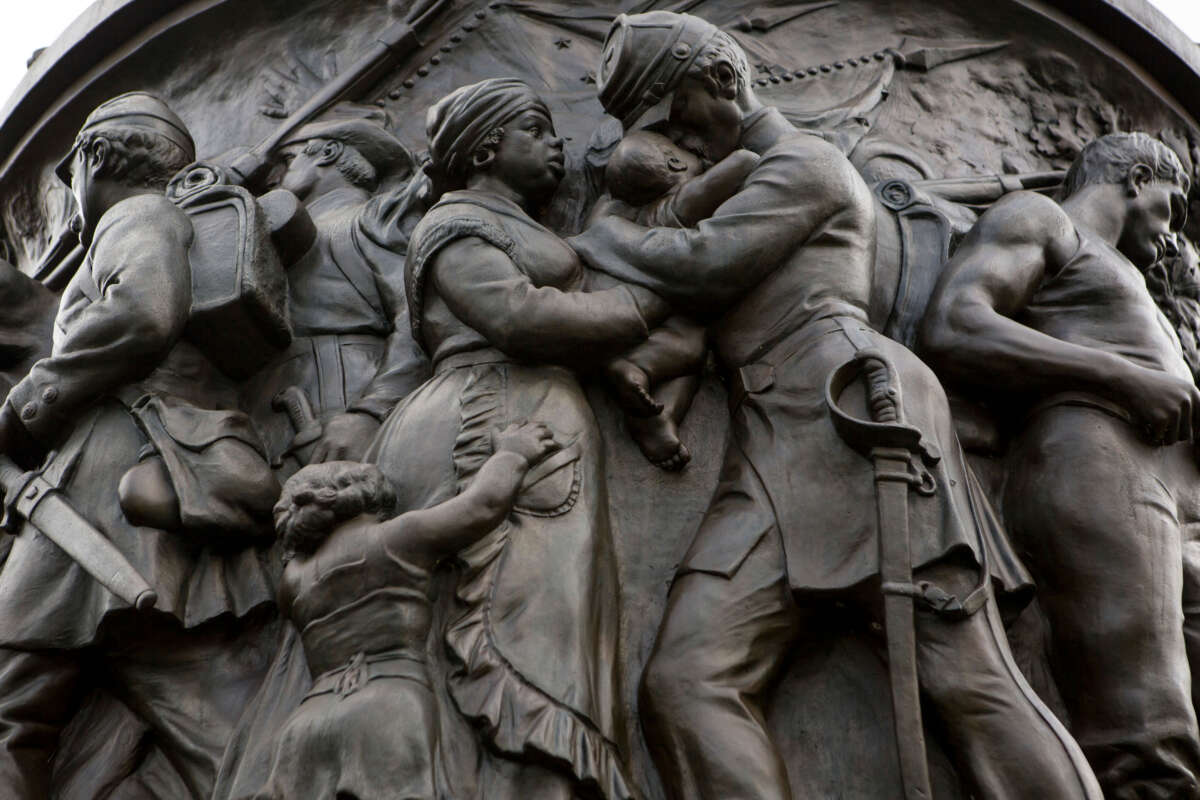A federal judge has blocked the removal of a Confederate statue at Arlington National Cemetery which depicts enslaved people, prior to and during the Civil War, as being content and devoted to their enslavers.
The statue, which is called the Confederate Memorial, was erected in Virginia in 1914 and features a female figure standing atop a 32-foot tall pedestal with an olive leaf crown. The sides of the pedestal contain mythical images of life in the antebellum south that reflect ideals pushed by revisionists and apologists of the Confederacy.
One of the images featured on the statue, for example, is a Black enslaved woman caring for the child of a Confederate military officer, in a caricatured “Mammy” stereotype that is widely recognized as a deeply racist trope. Another image shows an enslaved Black man following his enslaver into battle, to fight on the side of the Confederacy in the Civil War.
Thousands of Black Americans who were enslaved at the time of the Civil War did in fact fight for the Confederacy — however, these individuals were forced into battle by their enslavers, and the notion that they did so willfully or happily has been widely debunked by historians.
These kinds of false images were purposeful by these and other statues’ designers, historians have also noted, as the United Daughters of the Confederacy and similar organizations had wanted to distort the history of the Civil War and the treatment of enslaved people.
“The loyal-slave myth, and the monuments put up to sell the narrative, offer a transparent view how all tributes to the Confederacy honor the dishonorable, erasing historical truth in favor of a white supremacist lie,” Kali Holloway, a columnist for The Nation who is also a former director of the Make It Right Project, explained in an article she wrote in 2019.
The statue, like many others erected at the time, aimed to demoralize Black Americans at the turn of the 20th century.
“The statue was a way of reminding Americans who was in charge in the South and what the true traditions of the South were. It’s one of hundreds of statues that were created across the South in the first two decades of the 20th century whose purpose was to make sure that everybody knows that this is a white country, and that slavery was legitimate and benign,” American Historical Association executive director James Grossman said.
“When conservatives claim that removing the Confederate memorial in Arlington National Cemetery ‘stokes racial hatred’ they fail to acknowledge the long history of racial hatred embodied in the monument,” said Kevin M. Levin, former high school teacher who now works to educate other teachers about the authentic history of the U.S. during the Civil War era. “There are few things more dehumanizing than the image of the ‘loyal slave.”
The statue’s removal is part of a broader effort by the U.S. military to rename and remove imagery that commemorates racism and the Confederacy’s defense of slavery at various sites across the country. Forty Republican lawmakers in Congress called on Secretary of Defense Lloyd Austin to cancel the removal of the statue, dubiously claiming that it “commemorates reconciliation and national unity.”
The statue’s removal began on Monday, and was supposed to be completed by the end of this week. However, a federal lawsuit put a halt to those plans.
A group calling itself Defend Arlington, which is affiliated with another pro-Confederate monuments organization called Save Southern Heritage Florida, filed a lawsuit on Sunday seeking an injunction on the planned removal of the statue. U.S. District Judge Rossie Alston, who was appointed by former President Donald Trump, granted the injunction on Monday afternoon, halting the removal of the statue hours after crews had begun the process.
Defend Arlington, in addition to opposing removal for purported cultural reasons, alleges that removal of the statue will harm other monuments in the area. The deconstruction crews, however, had placed protective fencing around the statue, which could result in Alston overturning his own order in the near future.
In a footnote within his order, Alston stated that, “should the representations” from the litigants “in this case be untrue or exaggerated, the Court may take appropriate sanctions,” including if depictions of the removal of the monument harming nearby ones are false or exaggerated.
Our most important fundraising appeal of the year
December is the most critical time of year for Truthout, because our nonprofit news is funded almost entirely by individual donations from readers like you. So before you navigate away, we ask that you take just a second to support Truthout with a tax-deductible donation.
This year is a little different. We are up against a far-reaching, wide-scale attack on press freedom coming from the Trump administration. 2025 was a year of frightening censorship, news industry corporate consolidation, and worsening financial conditions for progressive nonprofits across the board.
We can only resist Trump’s agenda by cultivating a strong base of support. The right-wing mediasphere is funded comfortably by billionaire owners and venture capitalist philanthropists. At Truthout, we have you.
We’ve set an ambitious target for our year-end campaign — a goal of $250,000 to keep up our fight against authoritarianism in 2026. Please take a meaningful action in this fight: make a one-time or monthly donation to Truthout before December 31. If you have the means, please dig deep.
